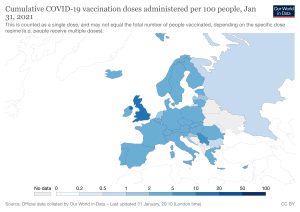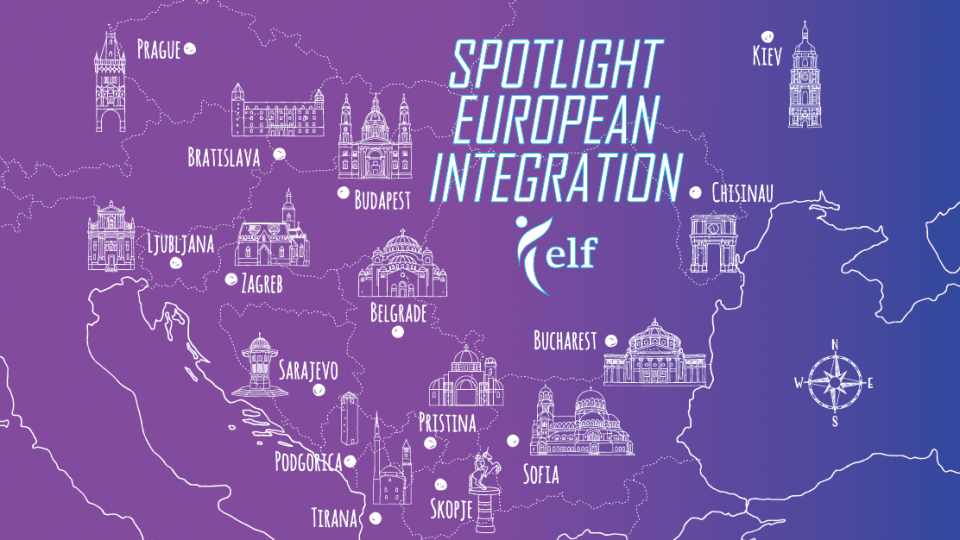Blog Post by Emil Kirjas, Founder of Kirjas Global, Vice President of Liberal International
Spotlight European integration blogpost series tracks the progress of EU enlargement with a liberal perspective, looking at Europe’s future.
Yet again the Western Balkans is the grey area on the European map*, this time in terms of the start of the mass Covid-19 vaccination process. With exception of Serbia, the Western Balkan nations are the only European nations that have still not started mass inoculation of their citizens. This is a direct consequence of the full reliance of the Western Balkan countries on the donations from the EU member states and the WHO-supported COVAX Facility, which is being mainly funded by the European Union. The EU has not only demonstrated its inability to provide sufficient vaccination for its own people, but it also failed the Western Balkan region. This latest development is a likely game-changer for how the public perceives China in the region.
European winners and losers
The United Kingdom was the European champion to start the vaccination of its citizens in the first half of December 2020. Having withdrawn from the EU and the authority of the European Medicines Agency (EMA), on 02 December Britain’s medicines regulator, the MHRA, made the UK the first country in the world to approve Pfizer/BioNTech vaccine for widespread use. Within less than a week, on 08 December the first UK citizen received the Pfizer jab. Trailing UK by 20 days, on 21 December EMA authorised the use of the first vaccine to prevent COVID-19, paving the way for the majority of EU member states to start the vaccination against COVID-19 before the end of 2020. The inoculation was initiated across the other EEA countries shortly after the EMA announcement. In a triumphant fashion, on 28 December the EU Enlargement Commissioner, Olivér Várhelyi, pledged €70 million for early access to EU COVID-19 vaccines to the “privileged partners” from the Western Balkans, announcing action “to enable a quick start of vaccination campaigns to critical staff and most vulnerable groups in the region early on.”
A month later, the Western Balkan countries, minus Serbia, are still struggling to get a delivery of any dose of a COVID-19 vaccine for its population. When pressed on 19 January 2021, the Commission Vice President responsible for Promoting our European Way of Life, Margaritis Schinas asked the Western Balkan countries for “a couple of weeks of patience” explaining that the funds at disposal, but there are no vaccines available on the market. He referred the matter to the forthcoming meeting of the European Council specifically on COVID-19, which on 21 January “reaffirmed their solidarity with third countries” which “should be delivered as soon as possible”, while “highlighting the importance of the COVAX initiative and Team Europe.” In other words, the EU’s message to the countries aspiring for membership in the Western Balkans was: Sorry, but Wait!
Edi Rama, the Prime Minister of Albania, was defiant in his tone towards the EU calling its attitude not only “unfortunate”, but also “morally and politically unacceptable” as well as “logically unjustified.” He made that statement at the symbolic start the inoculations, which is not on a mass scale, given Tirana has received only 975 doses of COVID-19 vaccines from an anonymous EU country. The Albanian Prime Minister also decried “everyone for themselves” attitude and announced that he secured a contract for 500,000 doses of the Pfizer/BioNTech vaccine directly for Albania, that is to be shared partially with Kosovo. “COVAX will function one day, but we don’t know, and no one knows when this will be possible”, explained Rama giving a blow to the EU’s multilateral global health initiative.
Serbia’s key ties to Moscow and Beijing
Serbia was the only country in the region that decided to act on its own and prepare for an alternative vaccination scenario. Benefitting for the fact that the Pfizer’s regional representation is in Belgrade, the Serbian leadership was fast to secure an independent shipment of 4,875 doses of the Pfizer vaccine already in the last week of December 2020. While the other countries in the Western Balkans were relying on the EMA authorisations, Serbia was fast to approve the Pfizer jab and became the third country in Europe, after Britain and Switzerland, to begin mass COVID-19 inoculations. The first to receive the vaccine was Serbian PM Ana Brnabic who in a jubilant fashion, stated that she is “honoured to be able to do this for [her] country.”
Serbia’s leadership didn’t stop there. It established direct contacts with its allies in Moscow and Beijing in order to procure the Russian and the Chinese vaccines, respectively. Already on 30 December, Serbia received the first batch of 2,400 doses of the Sputnik-V Russian vaccine, which lacks the approval of the European Medicines Agency or the World Health Organization. First in line to receive the controversial Russian vaccine were the Interior Minister, the Parliamentary Speaker, and the Health Ministry State Secretary on 06 January 2021, making Serbia and Belarus the only European countries using the Russian vaccine.
However, the major turn in the mass inoculation was the shipment of 1,000,000 doses of Chinese vaccine of Sinopharm, which was personally welcomed by Serbia’s President Aleksandar Vucic at the Belgrade airport. Vucic didn’t miss “to thank President Xi Jinping and Chinese leadership”, just as he did the start of the pandemics when the Serbian capital was flooded with government-paid banners thanking the Chinese President and the people. Soon, 200 coronavirus inoculation centres were set up across the country, where citizens are given an option to choose one of the three vaccines approved by Serbia’s Medicines Agency. The Chinese vaccine seems to be popular among the Serbian citizens that line up to receive their COVID-19 inoculation.
Dilemma for the Western Balkans
With the ongoing failure of the governments in the other Western Balkan countries to deliver an alternative to the delayed EU-support mechanism, the citizens of the countries are becoming increasingly impatient with EU’s impotence. The governments in the region have been resisting the temptation of the Russian and the Chinese vaccines, following the health and safety guidelines of EMA and relying on the promises from the EU to deliver on bilateral vaccine-support, as well as through the COVAX mechanism. As days and weeks go by, the inoculation in the EU is slow, but it works, while there are no signs of hope in the coming weeks in the Western Balkans. The only striking exception is Serbia, which is among the leading 10 countries in the world in COVID-vaccination, thanks primarily to Chinese and partially to Russian support.
Under growing public pressure, the authorities in North Macedonia have decided to depart from their exclusive pro-Western rhetoric on the safety of the vaccines and announced likely immediate purchase of the Chinese product. The health Minister of North Macedonia who until recently insisted that the nation can procure only products approved by EMA or the US FDA, suddenly found himself explaining to the public the opposite, i.e. the advantage and quality of the Chinese vaccine. Even Hungary, which has interest to export its authoritarian model in its southern neighbourhood, announced unilateral departure from the EU position with the procurement of the Sputnik-V Russian vaccine, and likely purchase of the Chinese vaccines.
These developments come in an already complex geopolitical context. The citizens from the Western Balkans continue to be isolated in their region surrounded by the EU, with the EU borders remain closed for them since the onset of the pandemic. While the EU indeed provided large financial support for mitigating the impact of the pandemic, those were not fresh new funds, but rather the allocated annual support re-directed for dealing with the effects of the pandemics. At the same time, Kosovo is still expecting its promised visa liberalisation with the EU. The negotiating frameworks for EU accession talks of Albania and North Macedonia remain blocked, Serbia and Montenegro have not achieved accession progress in the last year, and Bosnia’s EU prospects remain off the table.
There is an increasing general sense in the Western Balkans that the EU is either unwilling or unable to integrate the region. The eyes and hopes are turning to the new US administration, which has itself a lot of domestic and international challenges to deal with and is unlikely to pay great attention to this part of Europe.
Geopolitics reshaped
In May 2020, the Serbian president described the EU solidarity as “a fairy tale”, adding that only China can assist [in the Coronavirus response]. Many in the region and the EU were furious with these comments of the Serbian leader, who is often criticised for his authoritarian tendencies. However, Chinese Corona-diplomacy, emboldened by the overall EU impotence or incompetence towards the region, can prove to be a gamechanger with long-term consequences. The tide is turning under public pressure, and China steps in as a possible saviour not only of Serbia but likely of the whole Balkan region. This is not going to go unnoticed in the public opinion, which is very sensitive when it comes to its health and survival.
This vaccination failure could not have been a worse geopolitical stunt for the EU. People who feel constantly betrayed are likely to question their alliances. Regardless of the explanations provided, in 2020, the EU did not manage to handle the Covid-crisis nor its consequences Western Balkan region . How the EU reacts this year both internally and towards its internal “Western Balkan island” is likely going to define the geopolitics of the entire region for the next 10 to 20 years. No outcome seems to be carved in the stone.
*Cumulative COVID-19 vaccination doses administered per 100 people, Jan 31, 2021:

Source: Our World in Data
